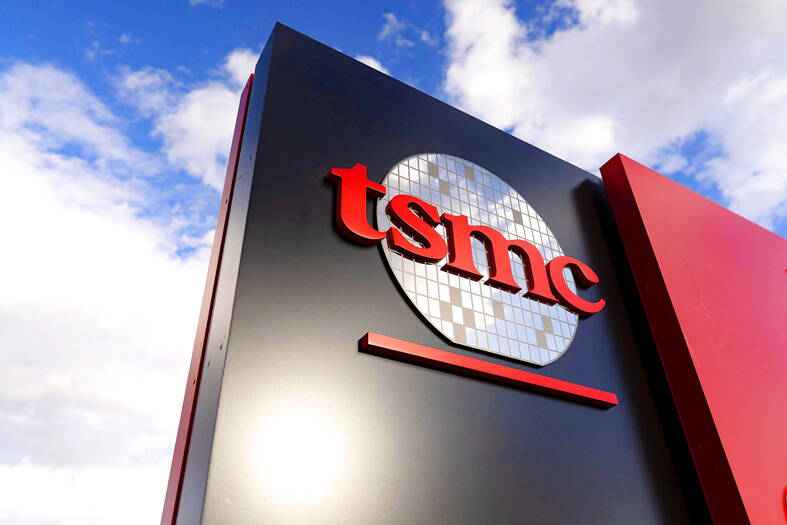Taiwan Semiconductor Manufacturing Co’s (TSMC, 台積電) revenue climbed 39.2 percent year-on-year in the first two months, quickening from last year in a sign of resilient demand for the Nvidia Corp chips that power artificial intelligence (AI) development.
The world’s largest chipmaker reported combined revenue for the first two months of NT$553.3 billion (US$16.81 billion). That compares with 34 percent growth for the whole of last year.
Last month alone, TSMC reported revenue of NT$260.01 billion, up 43.1 percent from a year earlier, but down 11.3 percent from a month earlier. Last month’s figure represented the company’s highest-ever sales for February.

Photo: Rebecca Noble, Bloomberg
Analysts said TSMC could still see its revenue increase to NT$266.7 billion or higher this month to achieve its first-quarter sales goal, which the company projected between NT$820 billion and NT$846.24 billion.
As the manufacturer of most of the AI chips in the world, TSMC’s sales are a barometer for the sector. Wall Street and Silicon Valley are now debating the sustainability of an AI frenzy that made Nvidia the world’s most valuable company, especially after China’s DeepSeek (深度求索) appeared to demonstrate a more frugal approach.
Last week, Broadcom Inc became the latest big tech firm to offer reassurance that spending on AI computing remains healthy. Before that, Taiwanese bellwether Hon Hai Precision Industry Co (鴻海精密) posted a 24.63 percent rise in revenue during the first two months of this year, also accelerating from last year.
A major uncertainty TSMC faces this year is whether US President Donald Trump would slap tariffs on chip imports. TSMC might have benefited from front-loading or stockpiling ahead of that potential move.
Last week, TSMC CEO C.C. Wei (魏哲家) joined Trump in the White House to outline an additional US$100 billion investment.
The move was widely viewed as intended to stave off tariffs, although it raised concerns that advanced technology could be moving away from Taiwan.
Additional reporting by CNA

SELL-OFF: Investors expect tariff-driven volatility as the local boarse reopens today, while analysts say government support and solid fundamentals would steady sentiment Local investors are bracing for a sharp market downturn today as the nation’s financial markets resume trading following a two-day closure for national holidays before the weekend, with sentiment rattled by US President Donald Trump’s sweeping tariff announcement. Trump’s unveiling of new “reciprocal tariffs” on Wednesday triggered a sell-off in global markets, with the FTSE Taiwan Index Futures — a benchmark for Taiwanese equities traded in Singapore — tumbling 9.2 percent over the past two sessions. Meanwhile, the American depositary receipts (ADRs) of Taiwan Semiconductor Manufacturing Co (TSMC, 台積電), the most heavily weighted stock on the TAIEX, plunged 13.8 percent in

A wave of stop-loss selling and panic selling hit Taiwan's stock market at its opening today, with the weighted index plunging 2,086 points — a drop of more than 9.7 percent — marking the largest intraday point and percentage loss on record. The index bottomed out at 19,212.02, while futures were locked limit-down, with more than 1,000 stocks hitting their daily drop limit. Three heavyweight stocks — Taiwan Semiconductor Manufacturing Co (TSMC, 台積電), Hon Hai Precision Industry Co (Foxconn, 鴻海精密) and MediaTek (聯發科) — hit their limit-down prices as soon as the market opened, falling to NT$848 (US$25.54), NT$138.5 and NT$1,295 respectively. TSMC's

TARIFFS: The global ‘panic atmosphere remains strong,’ and foreign investors have continued to sell their holdings since the start of the year, the Ministry of Finance said The government yesterday authorized the activation of its NT$500 billion (US$15.15 billion) National Stabilization Fund (NSF) to prop up the local stock market after two days of sharp falls in reaction to US President Donald Trump’s new import tariffs. The Ministry of Finance said in a statement after the market close that the steering committee of the fund had been given the go-ahead to intervene in the market to bolster Taiwanese shares in a time of crisis. The fund has been authorized to use its assets “to carry out market stabilization tasks as appropriate to maintain the stability of Taiwan’s

In a small town in Paraguay, a showdown is brewing between traditional producers of yerba mate, a bitter herbal tea popular across South America, and miners of a shinier treasure: gold. A rush for the precious metal is pitting mate growers and indigenous groups against the expanding operations of small-scale miners who, until recently, were their neighbors, not nemeses. “They [the miners] have destroyed everything... The canals, springs, swamps,” said Vidal Britez, president of the Yerba Mate Producers’ Association of the town of Paso Yobai, about 210km east of capital Asuncion. “You can see the pollution from the dead fish.